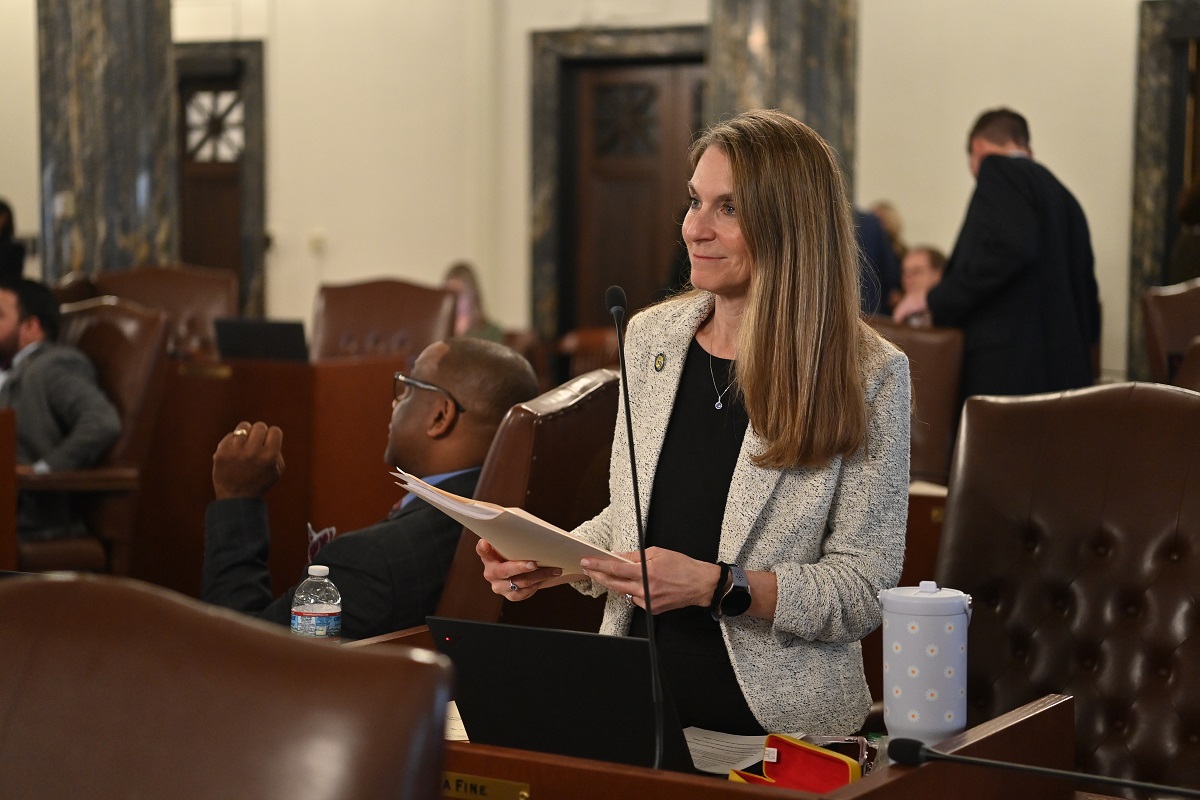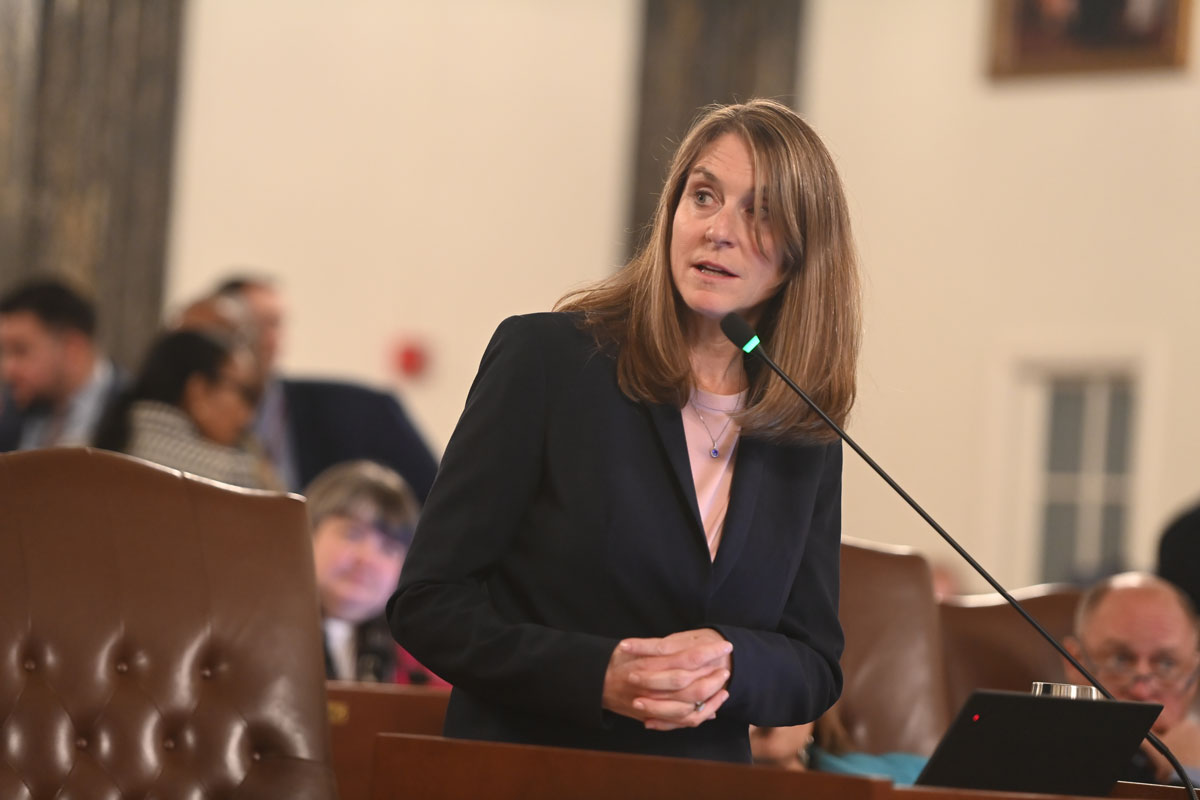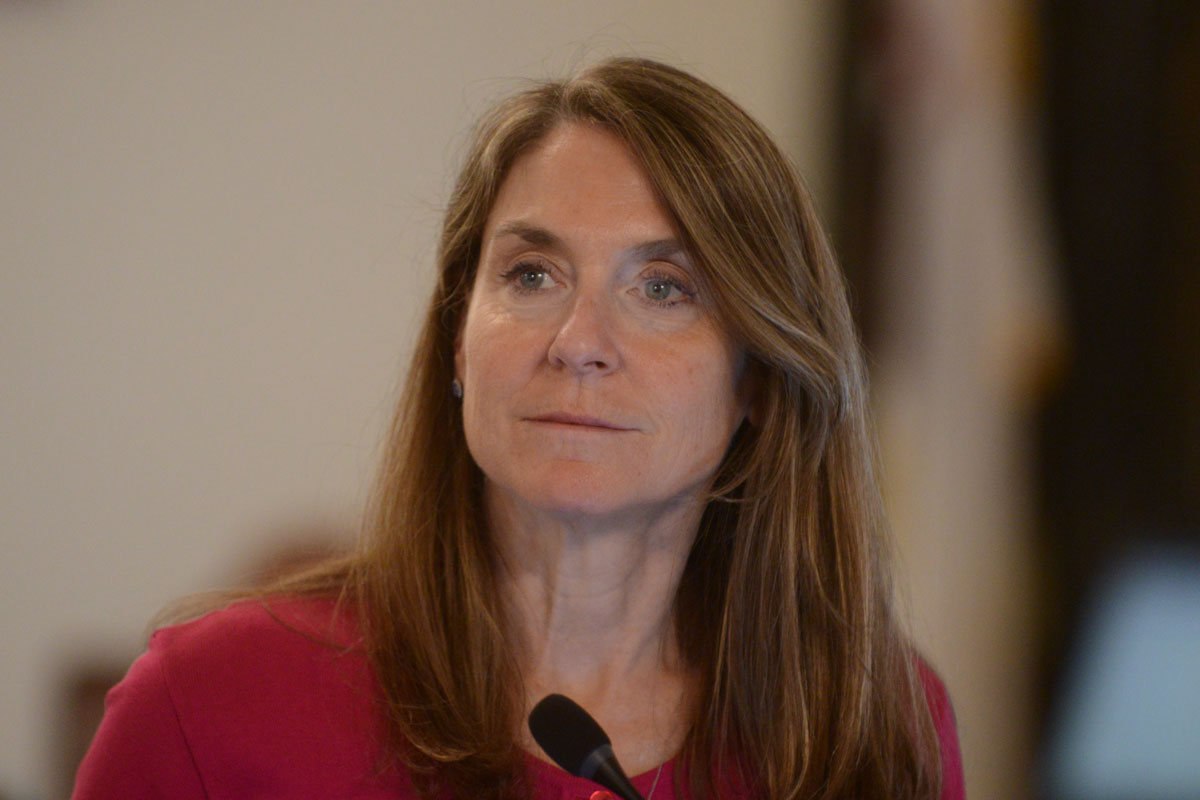- Details
- Category: Senator Laura Fine News

“No parent or caretaker should have to wait days to be notified that their loved one has died while under the care of a treatment facility,” said Fine (D-Glenview). “It is essential that these facilities and programs have clear standards in place for sharing information with a patient’s loved ones. No one should ever have to go through what Jordan’s family experienced.”
Under current law, a facility must provide verbal notice regarding a significant incident to the Department of Human Services within 24 hours. However, there is no mandate that requires a family member to be notified of a patient’s death within a specific timeframe.
- Details
- Category: Senator Laura Fine News

CHICAGO – Continuing the focus on building the behavioral health workforce in Illinois, Chairpersons of the Behavioral and Mental Health Committees, State Senator Laura Fine and State Representative Lindsey LaPointe convened the first of two joint Illinois House-Senate Behavioral and Mental Health Committee hearings Thursday.
“The state of Illinois is working with mental health professionals who are enacting groundbreaking solutions to expanding the behavioral health workforce,” said Fine (D-Glenview). “It is crucial to hear directly from mental and behavioral health providers across the state to learn the progress of these programs and how future legislation can make the biggest impact.”
Representatives of the Illinois Behavioral Health Workforce Development Center, a university partnership focused on making Illinois a national leader in supporting a robust system of behavioral health care providers, addressed the committee. Their testimony focused on the training programs being implemented to grow the workforce. They also talked about the roadblocks that need to be eliminated, including administrative burdens and gaps in Illinois’ mental health parity laws.
Read more: Fine convenes joint hearing to address shortage of behavioral health care professionals
- Details
- Category: Senator Laura Fine News
 SPRINGFIELD – Building on her previous legislation, a new law from State Senator Laura Fine strengthens consumer protections for the purchase of hearing aids.
SPRINGFIELD – Building on her previous legislation, a new law from State Senator Laura Fine strengthens consumer protections for the purchase of hearing aids.
“Hearing aids are important tools to help those with hearing loss communicate in ways they are most comfortable with,” said Fine (D-Glenview). “This legislation will ensure consumers have the protection of a 30-day return period so if a hearing aid is not supporting their communication needs, they will be able to return them for an alternative.”
Earlier this year, Senator Fine passed Senate Bill 1721 which required all hearing instruments and hearing aids to be dispensed or sold in accordance with the Food and Drug Administration and the Federal Trade Commission's regulations. This law also established the evaluation standards for a person seeking a hearing aid, and it permits the waiver of a prescription for a hearing aid if the individual is over 18.
Read more: Fine ensures consumer protections for hearing aid returns
- Details
- Category: Senator Laura Fine News
 SPRINGFIELD – Illinoisans will soon have annual mental health wellness visits covered under their insurance at no additional cost, thanks to a new law sponsored by State Senator Laura Fine.
SPRINGFIELD – Illinoisans will soon have annual mental health wellness visits covered under their insurance at no additional cost, thanks to a new law sponsored by State Senator Laura Fine.
“Much like annual checkups for your physical health, annual mental health visits allow specialists to identify or address underlying mental health concerns or new symptoms that may have come up in the past year,” said Fine (D-Glenview). “Offering these annual visits at no additional cost will encourage people to treat their mental health as seriously as their physical health, and seek this form of health care that everyone can benefit from.”
Read more: Fine’s law requires insurance to cover annual mental health visits
- Details
- Category: Senator Laura Fine News
 SPRINGFIELD – State Senator Laura Fine and State Representative Jennifer Gong-Gershowitz’s initiative to limit the consumption of single-use plastics and polystyrene by state agencies has just been signed into law. The Degradable Plastic Act, SB 58, prioritizes sustainability by banning the purchase or use of polystyrene or styrofoam by state agencies and universities by January 1, 2025.
SPRINGFIELD – State Senator Laura Fine and State Representative Jennifer Gong-Gershowitz’s initiative to limit the consumption of single-use plastics and polystyrene by state agencies has just been signed into law. The Degradable Plastic Act, SB 58, prioritizes sustainability by banning the purchase or use of polystyrene or styrofoam by state agencies and universities by January 1, 2025.
“By finding environmentally friendly alternatives to styrofoam, this new law allows the state government to lead the way in protecting our environment,” said Fine (D-Glenview). “Because it is so lightweight and easily breaks apart into smaller pieces, styrofoam tends to drift away. Since it is used so much in disposable packaging, polystyrene is one of the largest causes of global pollution.”
- Details
- Category: Senator Laura Fine News
 SPRINGFIELD – To further educate young people on the dangers of drug overdose, State Senator Laura Fine led a measure that improves our state’s curriculum on substance abuse for school-age students. This initiative, formerly known as SB 2223, was signed into law on Friday.
SPRINGFIELD – To further educate young people on the dangers of drug overdose, State Senator Laura Fine led a measure that improves our state’s curriculum on substance abuse for school-age students. This initiative, formerly known as SB 2223, was signed into law on Friday.
“Research has shown that the current school curriculum around substance abuse is insufficient; too many young people are finding themselves in danger of overdose without knowing what they need to do to save their life or help a friend,” said State Senator Laura Fine (D-Glenview). “We need to improve harm reduction strategies to better support young people in our state.”
The legislation is also known as Louie’s law. It is named after a suburban youth who died as a result of an overdose. Senate Bill 2223 requires ISBE to develop a standardized curriculum around the dangers of substance abuse with an emphasis on harm reduction and cultural competency. In addition to prevention, the curriculum will provide information on how to get support and medical assistance for people who may otherwise find themselves in a dangerous situation. Based on expert research and similar programs in other states, the goal of this initiative is to help prevent young people from overdosing and save lives.
“With this initiative, young people will have access to vital information to keep them safe, by reducing potential harm,” said Fine. “This will prevent other families from experiencing the same pain and loss as Louie’s family.”
Senate Bill 2223 was signed into law on Friday.
- Details
- Category: Senator Laura Fine News
 SPRINGFIELD – During the height of the COVID-19 pandemic, many people began utilizing mental health counseling via telehealth appointments. With many Illinoisans still benefiting from this form of treatment, State Senator Laura Fine passed legislation to ensure these telehealth appointments will continue to be covered under Medicaid insurance plans even though COVID-19-related telehealth policies are expiring.
SPRINGFIELD – During the height of the COVID-19 pandemic, many people began utilizing mental health counseling via telehealth appointments. With many Illinoisans still benefiting from this form of treatment, State Senator Laura Fine passed legislation to ensure these telehealth appointments will continue to be covered under Medicaid insurance plans even though COVID-19-related telehealth policies are expiring.
“Patients prefer telehealth appointments for a variety of reasons, including time-saving convenience or having the opportunity to get treatment from a specialist who is not locally available,” said Fine (D-Glenview). “This initiative will ensure Medicaid patients are still able to access this care with their insurance.”
- Details
- Category: Senator Laura Fine News
 SPRINGFIELD – With growing demands for mental health providers to support patients struggling with substance use, State Senator Laura Fine is encouraging people to become recovery support specialists through a new initiative expanding the behavioral health workforce student loan forgiveness program.
SPRINGFIELD – With growing demands for mental health providers to support patients struggling with substance use, State Senator Laura Fine is encouraging people to become recovery support specialists through a new initiative expanding the behavioral health workforce student loan forgiveness program.
“If we want people struggling with alcohol and substance abuse to receive the help they need to recover, we need to invest in the people working to become recovery support specialists,” said Fine (D-Glenview). “Thanks to this law, professionals will be able to get assistance for debts they took on while studying to become counselors, providing them financial relief and encouragement to enter this vital field.”
More Articles …
- Senator Fine passes rate review legislation, prevents excessive rate increases on health insurance
- Senator Fine celebrates Unplug Illinois Day
- Senator Fine to require insurance plans to cover annual mental health prevention and wellness visits
- Senator Fine bill to establish take-back program for ‘forever chemicals’
Page 6 of 22













 © 2026 Illinois Senate Democratic Caucus
© 2026 Illinois Senate Democratic Caucus